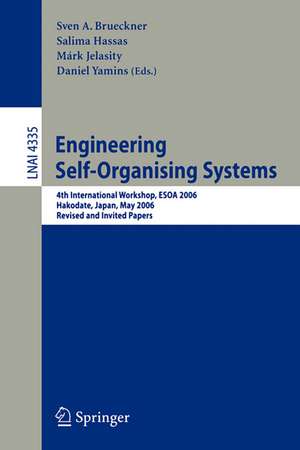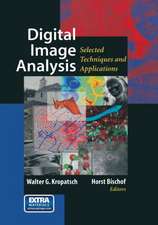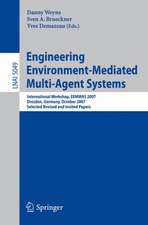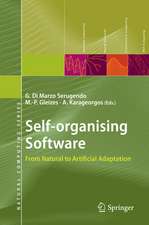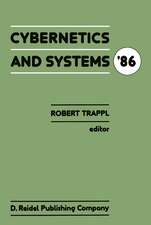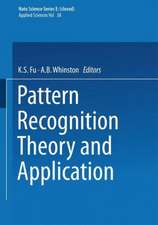Engineering Self-Organising Systems: Methodologies and Applications: Lecture Notes in Computer Science, cartea 3464
Editat de Sven A. Brueckner, Giovanna Di Marzo Serugendo, Anthony Karageorgos, Radhika Nagpalen Limba Engleză Paperback – 24 mai 2005
This book comprises revised and extended papers presented at the International Workshop on Engineering Self-Organising Applications, ESOA 2004, held in New York, NY, USA in July 2004 at AAMAS as well as invited papers from leading researchers. The papers are organized in topical sections on state of the art, synthesis and design methods, self-assembly and robots, stigmergy and related topics, and industrial applications.
Din seria Lecture Notes in Computer Science
- 20%
 Preț: 1061.55 lei
Preț: 1061.55 lei - 20%
 Preț: 307.71 lei
Preț: 307.71 lei - 20%
 Preț: 438.69 lei
Preț: 438.69 lei - 20%
 Preț: 579.30 lei
Preț: 579.30 lei -
 Preț: 410.88 lei
Preț: 410.88 lei - 17%
 Preț: 427.22 lei
Preț: 427.22 lei - 20%
 Preț: 596.46 lei
Preț: 596.46 lei - 15%
 Preț: 448.04 lei
Preț: 448.04 lei - 20%
 Preț: 353.50 lei
Preț: 353.50 lei -
 Preț: 389.49 lei
Preț: 389.49 lei - 20%
 Preț: 309.90 lei
Preț: 309.90 lei - 20%
 Preț: 645.28 lei
Preț: 645.28 lei - 20%
 Preț: 763.23 lei
Preț: 763.23 lei - 15%
 Preț: 580.46 lei
Preț: 580.46 lei - 20%
 Preț: 310.28 lei
Preț: 310.28 lei - 20%
 Preț: 655.02 lei
Preț: 655.02 lei - 20%
 Preț: 1183.14 lei
Preț: 1183.14 lei - 20%
 Preț: 340.32 lei
Preț: 340.32 lei -
 Preț: 449.57 lei
Preț: 449.57 lei - 20%
 Preț: 591.51 lei
Preț: 591.51 lei - 18%
 Preț: 938.83 lei
Preț: 938.83 lei - 20%
 Preț: 337.00 lei
Preț: 337.00 lei - 20%
 Preț: 649.50 lei
Preț: 649.50 lei - 20%
 Preț: 607.40 lei
Preț: 607.40 lei - 20%
 Preț: 1414.79 lei
Preț: 1414.79 lei - 20%
 Preț: 1024.44 lei
Preț: 1024.44 lei - 20%
 Preț: 583.40 lei
Preț: 583.40 lei - 20%
 Preț: 453.32 lei
Preț: 453.32 lei - 20%
 Preț: 575.49 lei
Preț: 575.49 lei - 20%
 Preț: 1075.26 lei
Preț: 1075.26 lei - 20%
 Preț: 585.88 lei
Preț: 585.88 lei - 20%
 Preț: 825.93 lei
Preț: 825.93 lei - 17%
 Preț: 360.20 lei
Preț: 360.20 lei - 20%
 Preț: 763.23 lei
Preț: 763.23 lei - 20%
 Preț: 340.32 lei
Preț: 340.32 lei - 20%
 Preț: 504.58 lei
Preț: 504.58 lei - 20%
 Preț: 369.13 lei
Preț: 369.13 lei - 20%
 Preț: 580.93 lei
Preț: 580.93 lei - 20%
 Preț: 343.62 lei
Preț: 343.62 lei - 20%
 Preț: 350.21 lei
Preț: 350.21 lei - 20%
 Preț: 583.40 lei
Preț: 583.40 lei - 20%
 Preț: 583.40 lei
Preț: 583.40 lei - 15%
 Preț: 438.59 lei
Preț: 438.59 lei - 20%
 Preț: 341.95 lei
Preț: 341.95 lei - 20%
 Preț: 238.01 lei
Preț: 238.01 lei - 20%
 Preț: 538.30 lei
Preț: 538.30 lei
Preț: 333.40 lei
Preț vechi: 416.75 lei
-20% Nou
Puncte Express: 500
Preț estimativ în valută:
63.80€ • 69.28$ • 53.60£
63.80€ • 69.28$ • 53.60£
Carte tipărită la comandă
Livrare economică 22 aprilie-06 mai
Preluare comenzi: 021 569.72.76
Specificații
ISBN-13: 9783540261803
ISBN-10: 354026180X
Pagini: 316
Ilustrații: XIII, 300 p.
Dimensiuni: 155 x 235 x 17 mm
Greutate: 0.45 kg
Ediția:2005
Editura: Springer Berlin, Heidelberg
Colecția Springer
Seriile Lecture Notes in Computer Science, Lecture Notes in Artificial Intelligence
Locul publicării:Berlin, Heidelberg, Germany
ISBN-10: 354026180X
Pagini: 316
Ilustrații: XIII, 300 p.
Dimensiuni: 155 x 235 x 17 mm
Greutate: 0.45 kg
Ediția:2005
Editura: Springer Berlin, Heidelberg
Colecția Springer
Seriile Lecture Notes in Computer Science, Lecture Notes in Artificial Intelligence
Locul publicării:Berlin, Heidelberg, Germany
Public țintă
ResearchCuprins
State of the Art.- Emergence Versus Self-Organisation: Different Concepts but Promising When Combined.- About Engineering Complex Systems: Multiscale Analysis and Evolutionary Engineering.- Adaptive Information Infrastructures for the e-Society.- Synthesis and Design Methods.- Agent-Based Modelling of Stem Cell Self-organisation in a Niche.- Ambient Cognitive Environments and the Distributed Synthesis of Visual Ambiences.- Using the Experimental Method to Produce Reliable Self-Organised Systems.- An Architecture for Self-Organising Evolvable Virtual Machines.- Self-Organising, Open and Cooperative P2P Societies – From Tags to Networks.- Self- ssembly and Robots.- Self-Organizing Spatial Shapes in Mobile Particles: The TOTA Approach.- Directed Self-assembly of 2-Dimensional Mesoblocks Using Top-Down/Bottom-Up Design.- Analysis of a Stochastic Model of Adaptive Task Allocation in Robots.- Emergent Team Formation: Applying Division of Labour Principles to Robot Soccer.- Stigmergy and Related Topics.- Analyzing Stigmergic Learning for Self-Organizing Mobile Ad-Hoc Networks (MANET’s).- Emergent Forecasting Using a Stigmergy Approach in Manufacturing Coordination and Control.- IDReAM: Intrusion Detection and Response Executed with Agent Mobility.- Managing Dynamic Flows in Production Chains Through Self-Organization.- Industrial Applications.- A Self-Organizing and Fault-Tolerant Wired Peer-to-Peer Sensor Network for Textile Applications.- Applying Distributed Adaptive Optimization to Digital Car Body Development.- Adaptive Service Placement Algorithms for Autonomous Service Networks.
